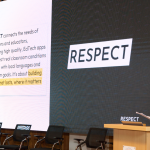January 30, 2022
We can all learn so much from each other. The education community is one filled with such diverse voices with different expertise and experiences and, if we support each other, the world really is ‘our oyster.’ So where can you go to learn from others? And where can we use our own voice to empower ourselves and our community?

Face-to-face learning is fantastic, but not always possible (especially right now) – but don’t worry, great opportunities are still at your fingertips!
Social media
I know social media can get a bad rap and, in some cases, rightly so. However, when connected with the right people it can be a very positive experience with lots of learning to be had! I especially love using Twitter. It’s amazing to see educators sharing what they do, their passions, seeing them use their voice to support others and grow in confidence in their own practice.
There are many communities on Twitter for educators and those working in education-based businesses such as EdTech, like #TinyVoiceTalks. Toria Bono invites those on Twitter to connect each Tuesday, share who they are and what they do, and use their voice to become part of the online community. I have developed my own PLN on Twitter who have been so supportive in all my ventures, and I have learnt so much from them in turn. I’ve been able to collaborate with them on multiple projects too.
Online resources
Podcasts, blogs, magazines, forums… the list goes on for fantastic resources you can access and be involved in! Maybe you want to create a platform for the education community of your own!
My passion project is R.I.S.E. Magazine. R.I.S.E is NetSupport’s online free education magazine. Its name stands for Reflect, Inspire, Support, Empower and it’s very much a collaborative magazine, full of contributions from voices across the education community. I have loved being able to provide a platform to empower educators and a resource that provides great free CPD and helps connections to grow! What has been most rewarding is the feedback from contributors. Some felt they didn’t have anything worth sharing or they weren’t going to be good enough to write something, but they were proven wrong. I’ve loved seeing their confidence develop. It has also been great to see schools printing off and placing the magazines on their CPD shelf, readers talking about articles that helped them learn something new to use in the classroom, and those that have been inspired to contribute to future issues.
It just shows how much an individual can shine when given the opportunity. Some educators struggle with feeling ‘not good enough.’ Working in such a highly scrutinised and pressured role, it is no surprise these kinds of anxieties are widespread, which is why it is so important that educators get to see the good in their everyday practice, be celebrated for their achievements and discover that others find significance in what they do.
Additionally, it is about championing diversity and inclusion; seeing all members of the educator community becoming empowered and given the opportunities to share their voice. There are some fantastic organisations and networks that are paving the way with this, such as the Global Equality Collective, WomenEd and The Early Years Black List. In R.I.S.E., it is important to us that not only do we have content about DE&I but that we ensure our magazine is inclusive for our contributors too. The more diverse the better and, as I said, we can all learn so much from each other!
RECOMMENDED: https://global-edtech.com/category/community/
Top three tips
How can we empower educator voices online?
- Celebrate others’ achievements. Share that book you read, a podcast you liked or blog that gave you an idea to put into practice. This lets the creator know that their efforts were appreciated and may encourage them to continue sharing their voice.
- Champion diversity and inclusion. Don’t just share from the ‘heavy hitters’ of the education world but build a PLN of a whole diverse range of educators. If you have the means to empower voices, e.g., via a podcast, make sure you give equitable opportunities to be as inclusive as possible.
- Provide a helping hand. Some educators may need encouragement to share their voice. You can work with them on a guest post for your blog or invite them to join a podcast with multiple guests so they can chip in when they feel comfortable doing so.










0 Comments